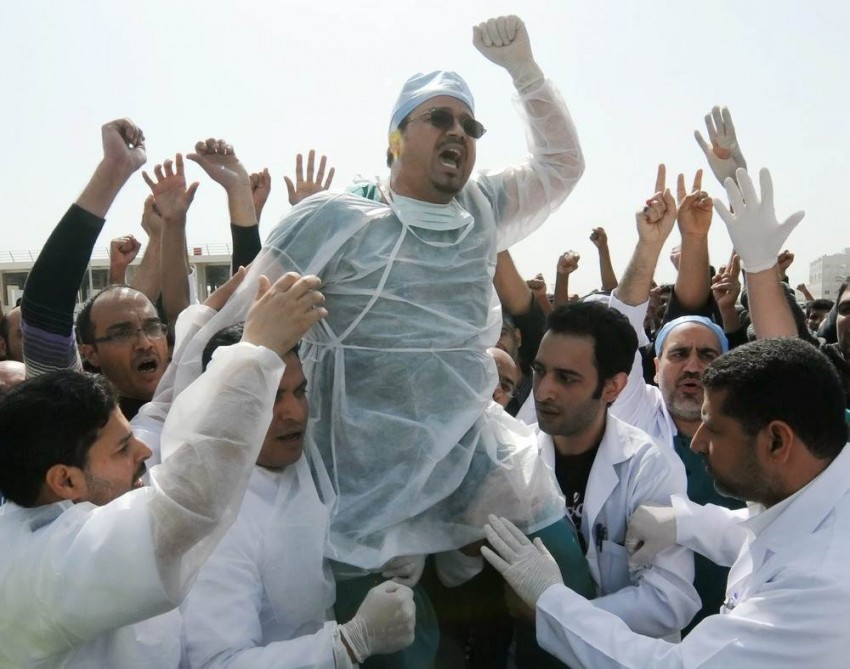Anna Nichols | Contributing Writer
Wednesday 5th February saw the Society for International Affairs and Diplomacy host one of its most ambitious and prevalent events to date when it held a panel discussion in the Innovation Academy concerning the political upheaval in Bahrain.
Unrest began in 2011, and has particularly affected the medical profession, but events have received little media. The guest speakers were Irish doctor and leader of a recent Irish humanitarian delegation to Bahrain Dr Damien McCormack, independent human rights activist Tara O’Grady, deputy director of Frontline Defenders Andrew Anderson and Bahraini doctor Dr Fatima Hajjim.
Although each speaker addressed a different aspect of the situation, all four guests acknowledged the importance of the event and its capacity to raise awareness of the abuses that continue to be carried out by the Bahraini regime, and to provide a forum for discussion where thoughts, questions and first hand accounts of the events could be exchanged.
Dr McCormack was the first to speak, focusing on the links between the Irish medical community and the situation in Bahrain. The community’s lack of response to the oppression, with the exception of a few groups, was criticised, which Dr McCormack asserted was indicative of the corruption and collusion that exists within the Irish medical profession, commenting that the influence of the Al-Khalifa regime that currently rules Bahrain reaches ‘all the way up to Stephen’s Green’. Dr McCormack discussed the connections the Royal College of Surgeons has with the Bahraini government, given its campus in Bahrain and the fact that the people running this ‘outrageous blackspot for human rights’ are the people ‘who have dinner with my colleagues’. He also outlined the inefficacy of international organisations such as the United Nations and the International Criminal Court in instigating meaningful progress, while speaking of his encounters with torture victims and the development of torture techniques.
Dr Fatima Hajjim then gave an account of her personal experience and involvement in the uprising, speaking of being suspended from work, then being ‘dragged’ through a show trial before being imprisoned. She stated that events such as this were instrumental in giving a voice to the Bahraini people and medics, and for highlighting the fact that human rights abuses in Bahrain did not end in 2011. She told the harrowing story of a sixteen year old who disappeared the day she left Bahrain and the turmoil his family went through for nineteen days as vital information was kept from them by the Bahraini civil services. Dr Hajjiim lamented the militarisation of the medical field in Bahrain, affirming that it compromised the humanitarian nature of being a doctor, which could have disastrous consequences for future Bahraini doctors, since ‘having a heart to help people is something you can’t learn from books.’
Next to speak was Tara O’Grady, who emphasised the importance of exercising the right to freedom of expression, particularly given the lack of coverage of events, encouraging everyone to tweet using the hastag #3rdBahrain in order to further raise awareness of the situation. O’Grady also noted Bahrain had been a very peacful island until the 1920s with the discovery of oil, and that political turmoil was not unusual in Bahrain, with there being a revolution every ten years since then.
Finally, O’Grady discussed the regime’s brutal response to what has been consistently peaceful and unsectarian protest,in particular the unjustifiable assault and torture of women and children. O’Grady also expressed fears that Bahrain was setting a dangerous precedent for the regimental abuse of students, prompted by the arresting of patients and doctors and the militarisation of hospitals.
The final speaker, Andrew Anderson of Frontline Defenders, commented on the friendliness of the indigenous civilian Bahraini population, noting that the torture and show trials of medics, one of which meant a close friend of Anderson’s was unfairly sentenced to life imprisonment, truly exposed the brutality of the regime. Anderson also highlighted the fact that the direction of such brutality towards medics is an unprecedented feature of the current situation, while the media’s incorporation of events into the ‘Arab Spring narrative’ has lead to an absence of references to the issue in national media which is further reinforced when compared to the coverage of similar events in Kuwait in the early 1990s. Anderson also praised the protestors for remaining ‘overwhelmingly peaceful’ in the face of such repression, and reemphasised the responsibility that those of us living in free and democratic societies have in standing up for human rights defenders, given the significance of the impact they make on the ground in such places.
After the addresses, there was a question and answer session, where members of the audience quizzed the guests on a number of issues, including what Irish students could do to break down the lack of media coverage, the extent of the Al-Khalifa regime’s influence on RCSI and the unclear reasoning of Bahraini officials for releasing particular prisoners. After the discussion, the attendees headed to a reception in KC Peaches, where the principal topic of conversation continued to be the events in Bahrain, making it clear that the event had been successful in igniting a humanitarian spark within the minds of those who attended. Given the success of the event, it seems like SoFIA, who has been up and running for less than a year, is going from strength to strength, and is likely to be a serious contender at this year’s Society Awards.
If future events are as engaging and thought-provoking as this, SoFIA should remain a society to watch.







